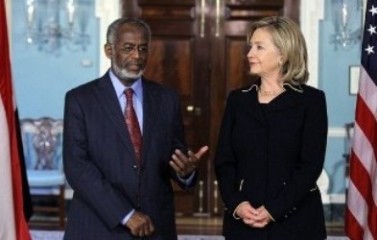US Secretary of state meets with Sudan’s foreign minister
September 29, 2012 (WASHINGTON) – The US Secretary of State Hillary Clinton met on Friday with Sudanese foreign minister Ali Karti in New York on the sidelines of the United Nations General Assembly (UNGA) meeting.

At the meeting Clinton thanked the leadership in Sudan and South Sudan for their wisdom that led to the signing of several cooperation agreements relating to border security, oil, economy and trade this week in the Ethiopian capital Addis Ababa through African Union mediation.
But key issues such as border demarcation and the status of Abyei remain unresolved.
Clinton also expressed appreciation to Sudan for efforts made to protect US embassy during demonstrations that swept Arab and Muslim countries to protest against the amateur movie produced in the US depicting prophet Muhammad in a derogatory manner.
The Sudanese foreign minister briefed his American counterpart on his country’s efforts to achieve security and stability through resolving conflicts.
Karti hailed the US role in peace initiatives and urged Washington to follow through on its promises by lifting sanctions and removing Sudan from the list of states that sponsor terrorism.
Washington still maintains its 1997 embargo on the country over Sudan’s role in hosting prominent Islamist militants. The sanctions restrict US trade and investment with Sudan and block the assets of the Sudanese government.
The US has promised to remove Sudan’s terrorism designation if it facilitated South Sudan’s referendum and recognize its results. South Sudan voted to secede from Sudan in January 2011 and declared independence in July that year.
Sudan was the first country to officially recognise South Sudan.
However, the conflicts that erupted in South Kordofan and Blue Nile border states last year as well as lack of progress on post-referendum matters made Washington attach additional conditions for the de-listing process.
(ST)
